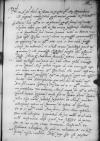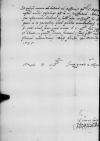Reverendissimo in Christo Patri domino, Domino Ioanni Dantisco, Dei gratia episcopo Culmensi et coadiutori Warmiensi, domino et fautori [obs]ervandissimo
Reverendissime in Christo Pater domine, Domine fautor mi praestantissime.
Mei commendationem illi perpetuam utramque salutem, gratiam divinam, gaudium et felicitatem.
Habuimus litteras Reverendissimae Dominationis Vestrae et plurimum gavisi sumus nos nactos aliquam occasionem, qua sibi et suis mereri possemus. Habuimus et dominum ⌊cancellarium⌋ suum, virum sincerum, rectum et bonum, cuius iustam causam et eius merita ac processum examinavimus et reperimus Dominationem Vestram Reverendissimam rite, recte et bene omnia fecisse, mense suo ordinario (ni aliud caveretur privilegio, quod nos ignoramus) illi providisse possesionem pacificam illum assecutum fuisse, illum quoque ardellionem, favoribus potentum ambientem, male appellasse, nec parti, nec iudici illam appellationem intimasse et ita citationem illius appellationis vigore non rite emanasse etc., nec debere aut teneri dominum cancellarium illi parere, nisi aut denuo citaretur processibus reverendissimi domini ⌊archiepiscopi⌋, quia iam cessavit facultas domini administratoris, quae etiam tanti non videtur etc., aut (quod omnino credimus) causam ad Dominationem Vestram Reverendissimam remittere, ut procedatur via ordinaria, aut, si magis suae reverendissimae dominationi placuerit, ex tunc virtute legationis causa hic in ⌊civitate Plocensi⌋ committere.
Interea aliis omnibus iudicibus inhibebitur et ubicumque procedet adversarius, optime nos speramus de iustitia domini ⌊cancellarii⌋ et Dominatio Vestra Reverendissima omnia bene fecit, bene illum instituit, bene etiam adversario expectativam de iure et ab initio nullam confirmavit, id est, quod iure subsistere non poterat hoc ita, ut in suo errore remaneret, confirmavit. Et coadiutoria adversarii sine gratia et voluntate Dominationis Vestrae Reverendissimae paenitus nihil valebit, solius papae haec est potestas Et quamquam omnino dubitare non possumus reverendissimum dominum ⌊archiep[iscopum]⌋ nostrum omnibus postulatis Reverendissimae Dominationi Vestrae satisfacturum, attame[n] pro informatione scribimus ei litteras nostras et cancellario suae domination[is], prout in eo exemplari, quod praesentibus introcludimus.
Et si quid aliud foret, quod amore Dominationis Vestrae Reverendissimae facere posse[mus], et libenter, et gratissime semper faciemus.
Cuius gratiae nos plurimum recommittimus.


